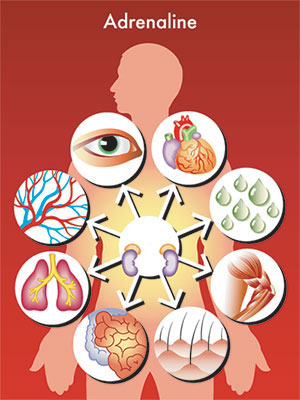Stress - The Silent Killer
 How is it possible that something can impact the body so powerfully, be more debilitating than a heart attack, more destructive than junk food, and destroy the health and well-being of millions worldwide and yet most people be completely in the dark about it?
How is it possible that something can impact the body so powerfully, be more debilitating than a heart attack, more destructive than junk food, and destroy the health and well-being of millions worldwide and yet most people be completely in the dark about it?
Because stress is invisible.
It is silent, and always in stealth mode...
Part of the problem with stress is that it is not a physical thing like a food we can recognize and avoid, or an addiction we can take steps to overcome. Nor is it a physical action we do that we can easily avoid. Many suffer from its ill effects and yet they are not even sure exactly what it is.
The root cause of all stress...
What Exactly Is Stress
Stress is a chemical reaction that happens within the body when we get upset, anxious, worried, sad, angry, scared, excited, confused, feel pressured, feel overwhelmed, or feel threatened. We all experience stress throughout the day to some degree, but for millions of people, it is elevated to a chronic state.
We worry about our job, our finances, and about our health. We have strained relationships with our spouses, children, parents, and siblings. We worry about things that have happened in the past, things that are happening today, and things that may or may not happen tomorrow. We have settled into a lifestyle that gives us no time for ourselves, nor for enjoying what life has to offer.
"Severe stress can be more debilitating to our health than a heart attack."
|
Just how dangerous is stress to our health? In short, it is a killer. It is a contributing factor to many serious health conditions and autoimmune disorders. The impact that stress has on the organs and systems of the body has been proven conclusively to have a devastating consequence to our health and well-being. Stress can be more debilitating than a heart attack.
The sobering fact is that you can eat all the healthy foods you want; trash all the processed foods, eat only organic, and have eating habits that are a shining example to the world. You can engage in a daily exercise program that is tailor made for health and longevity. But if you subject your body to continual stress, your chances of developing a chronic disease skyrocket. The consequences of ignoring the effects of stress are serious.
But many of us are not aware of just how stressed we are. In fact, many of us are chronically stressed and yet have absolutely no idea, which is why stress is now being coined as "The Silent Killer."
A Stressed Out Nation
The United States may be the world's richest nation, but it is far from the healthiest. It ranks top of the scale when it comes to a stress-ravaged population suffering an epidemic of chronic disease. Surveys show that European countries such as Greece, Italy, and France, are much happier and have lower levels of stress, depression, and suicide. The use of drugs for depression and insomnia are a fraction in other parts of the world in comparison to the US.
But why exactly is that?
Healthy Support Structure
There is a direct correlation between societies that have a strong support structure and happy people. The Greeks, for example, talk about their issues openly. Family members, neighbors, and communities are much more close-knit, and when somebody is angry or upset or needs emotional support, it is available to them. They "have it out" - there may be yelling and screaming and tears, but prescription pills are not the norm. Gaining strength from family and friends and neighbors is all the strength they need. Family time is important and meals are not swallowed in two gulps as we race to our next appointment or computer game.
Two of the healthiest states within the US are Vermont and Utah, both of which have developed much stronger support systems than their neighboring states.
Lifestyle Choices
We also let the stresses of daily living get the better of us. Our lifestyle choices directly contribute to our stress, as do our careers. We are continually barraged by a constant flow of worries about our job, our financial situation, stressful situations with our children, spouses, parents, and other relationships. We rush around like chickens with our heads cut off, giving ourselves no downtime. Abstract things can also serve to bombard us with stress, such as the daily news, upsetting movies, or not enough time for ourselves. Family gatherings can be very stressful for some people.
14 ways to reduce your stress right now...
The True Impact of Stress
The effects of stress take an emotional, physical, and psychological toll as we literally feel our life force being sapped away from us. From severe, debilitating diseases such as cancer, to early wrinkles showing up before their time, stress plays a part.
Stressful situations are not what actually cause harm to the body. It is how we respond and react to those stressful situations that causes the damage.
Let's take a look at the physical changes that our body undergoes during stress.
How stress impacts the body...
The body has a built-in preservation instinct that automatically responds to stressful situations. Both physical and chemical changes occur in the body, called the "fight-or-flight response:"
- The pituitary gland sends a signal to the adrenal glands to release hormones such as adrenaline.
- These stress hormones are released into the bloodstream, constricting our blood vessels.
- Blood pressure increases, and more blood is sent to vital organs and tissues, as well as to our arms and legs to help prepare our bodies for a fight-or-flight response.
- Our instincts are instantly sharpened and we become alert.
- Everything in the body is repressed or turned off that is not essential to our survival, including our growth process, the immune system, digestive process, elimination, and reproductive systems.

This fight-or-flight state can help save our lives in times of emergency as our energy is diverted to bodily responses needed to survive the stressful situation. The protection response that is produced by the body depends on the level of threat. Someone attacking us will provoke a much bigger response than an argument with a coworker or spouse, but ANY stress we experience provokes this same fight or flight response.
The functions that provide for the growth of the cells and the production of the body’s energy reserves are severely impacted. Growth is a vitally important process of life, for both adults and children. Each day, billions of cells in our body wear out and are replaced with new ones. For example, the entire cellular lining of our gastrointestinal tract is replaced every 72 hours. In order to maintain this continuous production of cells, the body needs to expend a significant amount of energy each day. If we experience chronic stress over long periods of time, the ongoing repression of growth severely compromises our vitality, and depletes our energy reserves.
"During stress, everything in the body is repressed or turned off that is not essential to our survival, including our growth process, the immune system, digestive process, elimination, and reproductive systems"
As the flow of stress hormones pumps throughout our body, restricting the different systems, we are at a much higher risk for chronic health conditions. The gastrointestinal system is a perfect example of a system that will experience various digestive disorders when subjected to stress.
Our bodies are intelligently designed with this fight-or-flight protection response. But this method of self-protection was never designed to be continuously activated. We were never built to endure a continual fight-or-flight response as a result of the everyday living stresses of anxiety, worry, and fear. This continual stream of stressors in our lives keeps our stress hormones at a chronically elevated level until we are classed as "chronically stressed." The result is that the stress in our bodies is never fully relieved, or the relief is only short-lived.
Almost every major illness that we experience can be linked to chronic stress.(1) It increases the risk of adult onset diabetes and high blood pressure, heart disease, cancer, and autoimmune diseases.
How stress suppresses the immune system...
The continual bodily response to stress compromises our immune system by interfering with our ability to fight disease. This is because the adrenal/stress hormones repress the immune system to instead focus on the "imminent danger" that generated the fight-or-flight response.
"Stress hormones are so effective at repressing our immune system that doctors provide them to organ transplant recipients to prevent their immune system from rejecting the foreign transplant"
But why would the stress response shut down our immune system? Simply because the brain must make a decision about which systems use too much energy, and divert this energy to the fight-or-flight response. When the immune system is fighting a bacterial or viral infection, it can consume a significant amount of the body's energy supply.
The body sees it as pointless to focus on fighting an illness if it perceives you are in danger, and your ability to fight the disease is short-circuited and the energy is mobilized instead to fight the "greater threat" of the fight-or-flight response.
How stress ages us...
Prolonged stress causes our bodies to age faster than they should by causing our telomeres to shorten prematurely.
"Shortened telomeres has been linked to cancer, diabetes, heart disease, & Parkinson's "
2012 Population-Based Health Study(2)
|
Telomeres are a special part of our chromosomes (the special molecules that contain our genes). Every time a cell in our body divides, the telomeres get shorter and shorter. As we age, the telomeres naturally shorten, and eventually become so short that they can no longer divide anymore and the cells die.
As more and more cells die, we experience the effects of aging, such as:
- Skin changes (wrinkles, loss of elastin, loss of collagen)
- Diminished eyesight and hearing
- Bone and joint weakening
- Diminished mental capacity
- Organ failure
Studies have revealed that stress causes the telomeres to shorten prematurely, accelerating the aging process. Not only that, but the mere anticipation of stress negatively impacts the telomeres. This means that a stressful event may not have even occurred, but the mere thought of it is enough to cause damage because of chemical reactions which the fear produces in the body.(2)
Stress-Free Living
Changing the way we respond to stress is the key to reducing it, but understanding the root cause of all stress is the key to eliminating it from your life for good. Learn about some simple lifestyle changes you can make right now to help significantly reduce your level of stress, and how you can conquer that stress gremlin for good.
View Sources & References
 How is it possible that something can impact the body so powerfully, be more debilitating than a heart attack, more destructive than junk food, and destroy the health and well-being of millions worldwide and yet most people be completely in the dark about it?
How is it possible that something can impact the body so powerfully, be more debilitating than a heart attack, more destructive than junk food, and destroy the health and well-being of millions worldwide and yet most people be completely in the dark about it? 



